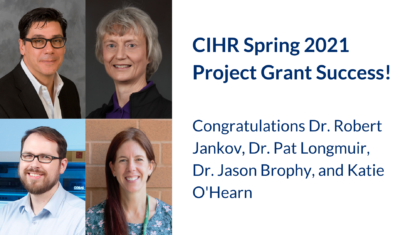Dr. Longmuir is a Senior Scientist in the Healthy Active Living and Obesity Research Group at the Children’s Hospital of Eastern Ontario Research Institute. Dr. Longmuir’s research interests are the promotion of physical activity to children with medical conditions and disabilities, and the use of physical activity to prevent and/or treat morbidity. Her focus is the impact of interventions to increase physical activity. Dr. Longmuir investigates the impact of providing physical activity and exercise within clinical care and avenues to build physical activity motivation and confidence among children with medical conditions and disabilities. Dr. Longmuir has published more than 90 papers and 6 book chapters in the peer-reviewed literature. She has delivered over 200 scholarly conference presentations, and more than 80 invited and keynote addresses. View Dr. Longmuir’s detailed bio.
Healthy Active Living and Obesity Research Group
Active Research Studies
Physical Activity for Children with Bleeding Risk
Related News
Research Projects
-
Impacting the physical activity confidence of children with medical conditions or disabilities: A randomized controlled trial
27/03/2025
Youth with medical conditions or disabilities (MCD) seldom achieve healthy physical activity recommendations. Barriers include a perceived lack of competence, fear of pain/symptom exacerbation, or physical function changes. A 12-week intervention targeting physical activity confidence was evaluated among youth with MCD. The study found that youth who were confident were more likely to engage in physical activity. The in-person intervention increased participants’ activity confidence. The limited impact of the virtual format suggests that implementing new skills with peers is critically important for enhancing activity confidence. Further research is required to evaluate whether confidence gains could be sustained beyond the study intervention, would longitudinally increase activity participation over time, or would transfer to other activity settings.
-
Height and Weight Trajectories are Associated with Submaximal and Maximal Exercise Capacity in Children with Congenital Heart Defects
12/02/2025
Children with congenital heart defects (CHD) are often short/lightweight relative to peers. Limited growth, particularly height, may reflect energy deficits impacting physical activity. Latent class analyses of growth from birth and Bruce treadmill exercise data retrospectively identified for height, weight, and body mass index z-scores growth trajectories. A very low height z-score trajectory is associated with decreased exercise capacity that may increase the risk for morbidities associated with a sedentary lifestyle. Future studies should examine potential mechanisms for the observed height deficits, such as an inadequate energy supply that could impact physical activity participation, congestive heart failure, cyanosis, pubertal stage, supplemental feeding history, or familial growth patterns. Prospective studies examining growth in relation to objective measures of daily physical activity are required.
-
In-Clinic Activity Promotion for Children with Congenital Heart Disease: Randomized Clinical Trial
06/01/2025
An effective in-clinic physical activity counseling intervention is needed to increase physical activity motivation and participation among children with moderate or severe congenital heart disease and enable clinicians to comply with activity promotion recommendations. This pragmatic, single-blind multicenter randomized clinical trial evaluated the intervention feasibility/efficacy among children aged 5-17 years. Clinicians delivered key messages, encouraged activity questions and discussion, and provided kinesiologist support. The primary outcome was daily activity, assessed after the clinic visit and then monthly for 6 months. Clinic visit length, % counseled, patient/family perceptions, and kinesiology referral assessed health care system impacts. Over 6 months, participants receiving a brief, standardized in-clinic activity counseling intervention with on-going kinesiology support were more likely to achieve the recommended daily physical activity. Counseling was feasible for clinicians to deliver during a routine clinic visit enabling compliance with recommended practice.
-
Understanding the Physical Literacy Development of 8- to 12-year-old Children Living with Chronic Medical Conditions: A Comprehensive, Mixed Methods Inquiry
01/09/2024
Physical literacy is a concept used to describe the combined physical, affective and cognitive capacities facilitating an active lifestyle. Physical activity participation is essential for children living with chronic medical conditions, but knowledge of physical literacy among this group is scarce. An explanatory, sequential mixed methods design was used to comprehensively describe the physical literacies of children with chronic medical conditions (CMCs). Children with CMCs can achieve recommended levels of physical literacy without meeting normative standards for physical competence. Participants would benefit from a physical literacy intervention that targets the development of bodily self-regulation skills and risk evaluation in active settings.
-
Quick, effective screening tasks identify children with medical conditions or disabilities needing physical literacy support.
03/01/2024
Activity adequacy, alone or with screen time, most effectively identified children likely to benefit from physical literacy support. Adequacy and screen time questionnaires are suitable for clinical use. Similar results regardless of diagnosis suggest physical competence deficits are not primary determinants of active lifestyles. Research to enhance screening specificity is required.


